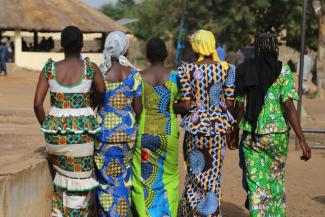According to UNICEF, 55 percent of Malian girls marry before the age of 18 (2016). Mariam (pseudonym) is a 15-year-old girl who lives with her parents. Full of ambition, Mariam dreams of becoming a nurse, although she enrolled late in school. In her village, early marriage is a common practice which is rooted in tradition and supported by religious beliefs. Parents believe that marriage ensures a steady future and protection for their daughters.
One day, upon coming back from school, Mariam discovered that she was to be given in marriage to a someone much older than her. With no desire to be married and willing to continue to pursue her dream of becoming a nurse, Mariam decided to seek refuge with her older brother in the city of Kayes. Unfortunately, when Mariam got to Kayes she was totally disoriented. With no way of reaching her older brother, she decided to confide in her fellow travelers, who referred her to the Regional Department for the Promotion of Women, Children and the Family welcome center, for care.
Upon her arrival at the center, she explained her situation and her need for assistance. As a result, the center’s staff decided to handle her case. The USAID funded New Partnership Initiative EXPAND Gender Focal Point – who works in collaboration with the center – was able to negotiate with Mariam's family and help them understand that an early marriage would not be a good choice for Mariam and to allow her to continue her studies.
When I heard about the wedding, the only thing on my mind was to run away. I didn't know where to go at first, but I had to go far from the village to escape this marriage I didn't want,” Mariam.
Thanks to this intervention by the staff, Mariam’s family understood the consequences of an early marriage and changed their attitude towards their daughter’s rights. They also understood their duty to protect the child. Moreover, they understood that Mariam's place was at school, not in a home she had not chosen. The plan for an arranged marriage was cancelled, leaving Mariam to pursue her dreams and study.
Similarly, with USAID support, the New Partnership Initiative EXPAND and its partners gender lead organization, International Association for Maternal and Neonatal Health and the One Stop Centers have been able to assist 124 survivors of gender-based violence and discrimination from November 2022 to September 2023. The One Stop Center is a holistic care center for survivors of gender-based violence. Among the124 victims to the One Stop Center, 28 women, 6 men, 8 boys and 82 girls in Kayes and Koulikoro regions received support, care, and guidance to help them overcome the various forms of violence they had suffered. There these victims of gender-based violence find the assistance they needed.

Credit: USAID Mali
